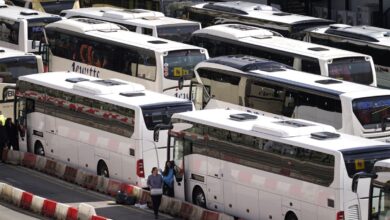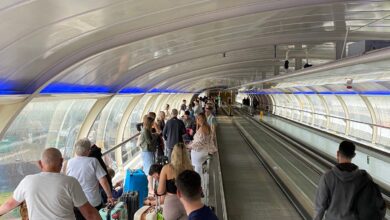As Spain launches free train travel for commuters, why is the UK falling so far behind the rest of Europe?

Ever since Brexit, I often feel jealous of our European neighbours when it comes to travel.
After all, for the most part they have the privileges which we used to enjoy: crossing borders with zero red tape; enjoying stays of however long they like (none of this “90 days in 180 days” nonsense); the ability to travel on a passport up to the day it expires; no mobile roaming charges. (It doesn’t help my mood, either, that we gave up all of these perks by choice.)
But I’m experiencing a renewed spike of envy this week, sparked by several countries’ innovative policies aimed at getting more people using public transport and helping alleviate the sting of the cost of living crisis.
As one scheme ended, another began. Germany’s programme – which allowed unlimited travel on regional trains, trams, buses and even some river ferries for just €9 a month during June, July and August – was hailed a roaring success, with 52 million tickets sold and an estimated 1.8 million tons of carbon saved.
Meanwhile, the day after the German experiment finished, Spain launched its own version: free train travel for season ticket holders on numerous journeys. The scheme, running from 1 September until the end of December and aimed squarely at Spanish commuters, allows complimentary multi-ticket trips on Cercanías and Rodalies commuter trains and regional journeys of less than 300km on Media Distancia trains.
And get this: when first introducing the idea of the four-month venture, Spanish Prime minister Pedro Sánchez said: “I am fully aware of the daily difficulties that most people face.
“I know that your salary is getting less and less, that it is difficult to make ends meet, and that your shopping basket is becoming more and more expensive.
“I am going to work my skin to the bone to defend the working class of this country.”
Imagine hearing someone in a position of power promising to actually help people struggling to survive amid the present cost of living crisis – and then seeing them follow through with a tangible policy designed to ease that financial burden. In the UK, as Boris finally steps down (adding insult to injury by suggesting that buying a new kettle could solve our energy woes) and his successors continue with their political posturing, we can only dream of such forward-thinking leadership.
What have our transport tsars pledged to do to alleviate some of the forthcoming hardships? Limit the next rail fare price hike to “below inflation” – 13.6 per cent RPI in July 2022, the month which usually dictates the annual train price rise in January – and delay it until March 2023. At which point it can presumably “only” rise by 13.5 per cent, at most. Mmm, isn’t it just like a hug all around your heart?
Meanwhile, the public transport services we have barely feel fit for purpose. Summer travel was blighted by numerous strikes across the UK’s train, bus and Tube networks as disgruntled workers protested dwindling real-terms pay and demanded better job conditions and security. The pattern looks set to continue into September, with two days of industrial action already announced, one involving 40,000 members of the RMT union plus members of the train drivers’ union Aslef, the other by the smaller TSSA union representing white-collar railway staff.
And then there’s Avanti West Coast, brought to its knees by employee sickness and what it has called “unofficial strike action” by drivers refusing to work overtime. The operator had to slash services in response, leading to overcrowded, overheated trains, with the pared-back schedule in place until at least 11 September. We are looking down the barrel of a winter of travel discontent.
It’s not simply that it is infuriating for train travellers. This is the very point in the climate crisis at which we need to be encouraging more people to swap cars and planes for public transport, and there is less than zero incentive to do so.
Far from following in Germany and Spain’s footsteps, the UK’s transport secretary is still involved in a months-long blame game, pointing fingers at unions and threatening to curb their powers. “The Government is going to act,” he wrote in the Express in August. “My 16-point plan of trade union reform will give individual union members more power, if they want, to rein in their limelight-loving, politically-motivated bosses. The plan insists on re-ballots before each strike, to show the action still has members’ support.”
Like I said, I’m jealous of our neighbours. The looming cost of living crisis and soaring energy prices call for innovative, outside-the-box ideas to help people cope – ideas like slashing the cost of public transport, even if just for a few months. But I fear the most we can hope for in Britain is an autumn of ideological deadlock, in which slashed prices will be swapped for slashed schedules.





